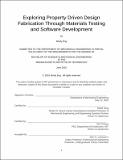Exploring property driven design fabrication through materials testing and software development
Author(s)
Eng, Mindy
DownloadFull printable version (1.563Mb)
Other Contributors
Massachusetts Institute of Technology. Dept. of Mechanical Engineering.
Advisor
Maria Yang and Neri Oxman.
Terms of use
Metadata
Show full item recordAbstract
Since its introduction in the late 1980s, layered manufacturing has become an increasingly efficient and common means to delivering functional and visually representative prototypes in relatively short amounts of time from previously prepared Computer-Aided Design files. However, most layered manufacturing technologies today produce only single material, constant property prototypes from a limited array of materials. In this project, we explore a different approach to layer manufacturing, namely, a layered manufacturing product that, while using a single material, produces an entity of varying material properties. Materials testing of PMC®-724 demonstrate the material's capacity to possess a range of Shore A Hardness over a range of elasticity, illustrating the potential for printing with variable property materials. Moreover, we will also explore a new approach to fabrication that challenges the concept of Computer- Aided Manufacturing (CAM) by introducing a software application that, rather than providing a means of digitizing the geometry of a completed design, allows engineers and designers to create and design structures that are defined at various points by their material behavior as opposed to their geometry. As a proof of concept demonstration, a mono-material, variable property shoe sole will be printed using property-mapped polyurethane elastomer PMC®-724 with the new software.
Description
Thesis (S.B.)--Massachusetts Institute of Technology, Dept. of Mechanical Engineering, 2010. This electronic version was submitted by the student author. The certified thesis is available in the Institute Archives and Special Collections. Cataloged from student submitted PDF version of thesis. Vita. Includes bibliographical references (p. 33).
Date issued
2010Department
Massachusetts Institute of Technology. Department of Mechanical EngineeringPublisher
Massachusetts Institute of Technology
Keywords
Mechanical Engineering.